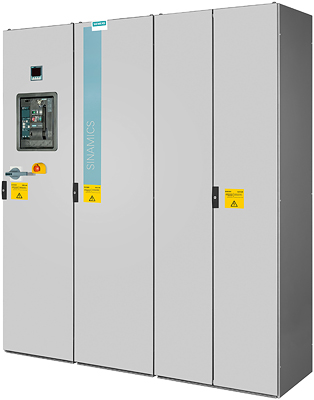Liquid cooling in Siemens converters reduces energy consumption

Thanks to the sealed cabinet system, the liquid-cooled Sinamics S120 Cabinet Modules frequency converter is ideally suited for use in harsh environments. Efficient heat dissipation means there is no need for air conditioning, which markedly reduces energy consumption.
- Efficient heat dissipation in liquid-cooled Sinamics S120 Cabinet Modules makes air conditioning unnecessary
- Footprint smaller than with comparable air-cooled cabinets
- Simple ordering process, installation and implementing thanks to integration into commercially available engineering tools
The liquid-cooled Sinamics S120 Cabinet Modules frequency converter from Siemens is a converter for use in harsh ambient conditions. Efficient heat dissipation means there is no need for air conditioning, which markedly reduces energy consumption. Both optimized layout and effective cooling have helped to reduce the module’s footprint. Since the liquid-cooled Sinamics S120 Cabinet Modules frequency converter is integrated into commercially available engineering tools it also makes ordering easier.
Sinamics S120 Cabinet Modules frequency converters are part of a modular cabinet system for multi-motor drives. Siemens has extended this portfolio with a view to using it in such specifically harsh environments as in mining or the steel industry, where it makes sense to use a sealed cabinet to protect against chemically aggressive atmospheres.
The liquid-cooled Sinamics S120 Cabinet Modules provides a liquid cooling solution that is fully enclosed in order to protect the frequency converters against hostile ambient conditions. Here, a special cooling technology makes heat dissipation efficient and renders air conditioning unnecessary. Added to this, liquid cooling uses little energy which makes for leveraging additional energy savings potential.
Heat recovery principles can also be exploited by using the coolant heated up during the cooling process to provide low-cost process heat or room heating.
All individual liquid-cooled Sinamics S120 Cabinet Modules are perfectly compatible, modular, and can be flexibly combined. Additional a wide range of options is available, allowing specific requirements to be accommodated with ease. Factory pre-configuration and integration into commercially available selection and engineering tools, such as the Katalog, PMD and Sizer, make for simple ordering, installing, and commissioning of the system.
Sinamics S120 Cabinet Modules converters are mainly used in process, steel, and automotive industries and in the mining.
For further information on S120 Cabinet Modules, please see www.siemens.com/sinamics-s120-cabinet-modules
Siemens AG (Berlin and Munich) is a global technology powerhouse that has stood for engineering excellence, innovation, quality, reliability and internationality for more than 165 years. The company is active in more than 200 countries, focusing on the areas of electrification, automation and digitalization. One of the world’s largest producers of energy-efficient, resource-saving technologies, Siemens is No. 1 in offshore wind turbine construction, a leading supplier of combined cycle turbines for power generation, a major provider of power transmission solutions and a pioneer in infrastructure solutions as well as automation, drive and software solutions for industry. The company is also a leading provider of medical imaging equipment – such as computed tomography and magnetic resonance imaging systems – and a leader in laboratory diagnostics as well as clinical IT. In fiscal 2014, which ended on September 30, 2014, Siemens generated revenue from continuing operations of €71.9 billion and net income of €5.5 billion. At the end of September 2014, the company had around 343,000 employees worldwide on a continuing basis.
Further information is available on the Internet at www.siemens.com
Reference Number: PR2015040162PDEN
Contact
Mr. Stefan Rauscher
Process Industries and Drives Division
Siemens AG
Gleiwitzer Str. 555
90475 Nuremberg
Germany
Tel: +49 (911) 895-7952
stefan.rauscher@siemens.com
Media Contact
All latest news from the category: Trade Fair News
Newest articles

NASA: Mystery of life’s handedness deepens
The mystery of why life uses molecules with specific orientations has deepened with a NASA-funded discovery that RNA — a key molecule thought to have potentially held the instructions for…

What are the effects of historic lithium mining on water quality?
Study reveals low levels of common contaminants but high levels of other elements in waters associated with an abandoned lithium mine. Lithium ore and mining waste from a historic lithium…

Quantum-inspired design boosts efficiency of heat-to-electricity conversion
Rice engineers take unconventional route to improving thermophotovoltaic systems. Researchers at Rice University have found a new way to improve a key element of thermophotovoltaic (TPV) systems, which convert heat…



